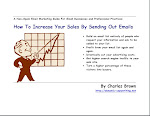A lot of businesses have noticed their competitors posting white papers on their websites and have become aware of the tremendous increase in the number of them being written and circulated on the internet. So it's only natural that they ask, "What products or services could be marketed better with white papers?"
According to Perry Marshall, a well-known writer who specializes in white papers, almost all papers are written for the b2b (business to business) market. Few, if any, are for the business-to-consumer market.
Marshall goes on to say that there are three types of situations when a white paper is called for:
- When your company is introducing a new product or service. This is especially true when what you offer is intended to solve a problem the customer may not fully understand or appreciate.
- When your company sells a product or service that is complex and requires a white paper to explain in simple terms what you do. Often your buyer will have to explain your product or service to others within her organization and your white paper will aid in that communication.
- When your company sells an expensive product or service. When a major expenditure is involved, someone's job may be at stake if the money is not spent wisely. A white paper is a vital part of the due diligence process for that person or team. Just having your paper in their file demonstrates that they sought out information before making the purchase.
All this means that a white paper must have an air of objectivity to it. Unfortunately, to many people the term "white paper" has become synonymous with "thinly disguised sales pitch."
Yes a white paper must transition into a persuasive document and end with a call for action, but it must first establish itself as a document that can be trusted to present the facts without an undue slant.
White Papers are Problem-Solving Documents
One way to approach this is to begin with a problem that must be solved. Studies have shown that we are much more motivated by the fear of loss or avoidance of pain, than we are by the promise of gain. So spending time focusing on a problem, why some solutions will not work or are extremely costly, is time well spent.
And, if written without hyperbole, it does not disrupt the sense of objectivity you want to project.
Admit Flaws and Limitations
A second way to establish credibility and objectivity is to admit some shortcomings with your product or service. Clearly you want to use this method sparingly, but the key is to not try to present what you sell as the best thing since white bread, because it is not. Instead use its flaws and limitations to position it in the market place.
I remember going on a family vacation to Myrtle Beach, South Carolina when I was 10 yeas old. My parents had driven all day and were tired (my brothers and I just wanted out of the car to go swimming).
But when we got to the beach, all the name-brand hotels had their "No Vacancy" signs out. So we drove to the second street from the beach and my parents found a humble little place with a sign out front that said, "Not Fancy – But Clean."
That was all my exhausted parents wanted. They felt that even if we only stayed one night and changed hotels, it would be worth it to find a place to stay for now.
And sure enough, the hotel lived up to its claim and was clean, comfortable and very pleasant. We stayed all week and never changed to a different hotel.
And I learned a valuable copywriting lesson about positioning what you sell by admitting what it isn't.
Praise a Competitor
A third way to build credibility and demonstrate your objectivity is to say positive things about your competition. Again, you don't want to go overboard doing this, but think of using this idea hand in hand with the previous point of admitting your product or service's flaws.
For example, a law firm that specializes in working for small business franchise owners, could easily admit that one of their competitors has an expertise in the area of corporate mergers.
Even if this other firm is a competitor in other areas, by making a positive statement about that firm's expertise in mergers, the first firm can position itself as being an expert in the own area of franchise law.
Jay Levinson advocates this idea in his Guerrilla Marketing books. The point is not to send your own business away to an other firm, but to position yourself, by re-positioning your competition.
This in effect not only tells your reader that you are objective enough to say good things about competitors, it also allows you to position your competitor as they other guy who does something else.
************
Be careful about what kind of white papers your company produces. If they come across as thinly disguised sales pitches, you will lose all the credibility you had hoped to gain. Of course you are writing your white paper to sell something, but this is not the format to push too hard. This is a document that must maintain its air of objectivity above all else.
COPYRIGHT © 2008, Charles Brown

Labels: lawyer marketing, white papers
Subscribe to:
Post Comments (Atom)



0 comments:
Post a Comment